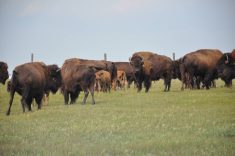VULCAN, Alta. – The definition of a Canadian is someone who says “thank you” to a bank machine.
That comment got a laugh at the Vulcan Legion Hall where 100 farmers gathered to talk with Reform party MPs about the farm crisis.
Farmers agreed that their politeness might be contributing to the problems in western agriculture.
Those who attended were told that if they don’t rise up and assert themselves, they could end up in the same boat as east coast fishermen.
The Reform party is touring small-town Canada and hopes to talk to at least 4,000 farmers. The party hopes to learn what can be done to maintain a viable farming sector.
Read Also

Trump’s tariffs take their toll on U.S. producers
U.S. farmers say Trump’s tariffs have been devastating for growers in that country.
A recurring message has been heard.
“Let’s get some cash out here. How do you guys want to do it?” asked Lloydminster MP Gerry Ritz.
Ritz, a farmer from northwestern Saskatchewan, has struggled to stay afloat and tried his hand at everything from grain to ostriches. He understands failed markets.
“I’ve got a $100,000 pair of boots,” he said as he raised his slick-looking boot made of ostrich leather.
Changes needed
The Reform party is making a list of solutions that could solve some of the immediate problems in agriculture. Besides a quick cash injection, which Ritz said “is a hand up not a handout,” the party proposes changes to the crop insurance plan.
Farmers also need a break on freight rates. He suggested freight bills be submitted at year end and that the federal government inject an equivalent amount of money in the farmer’s Net Income Stabilization Accounts. The party also suggests a break on service charges and taxes.
The Vulcan area in southern Alberta looks prosperous, but that appearance is deceiving, said farmer Elaine Hall.
“It’s damn serious now,” she said.
With oil at $40 per barrel, that industry provides decent jobs for young people and injects money into the community, she said.
But for older farmers who are losing a lifetime of investment in their farms, the picture isn’t so rosy, she added.















